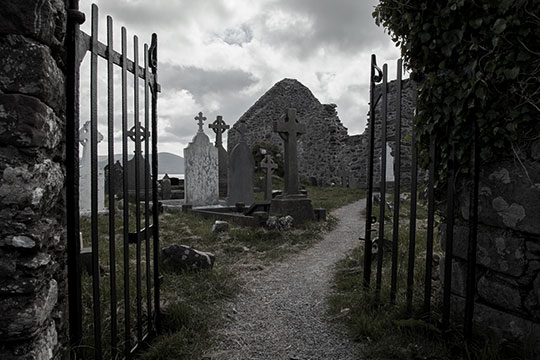The Gates of Hell
Series:

Keys to the Kingdom, Part 3
"On this rock I will build my church, and the gates of hell shall not prevail against it. I will give you the keys of the kingdom of heaven, and whatever you bind on earth shall be bound in heaven, and whatever you loose on earth shall be loosed in heaven." (Matthew 16:18-19)
Yeshua said, "On this rock I will build my church, and the gates of hell shall not prevail against it." What did he mean when he said "the gates of hell will not prevail against it"? Whenever I used to read this part of the verse I would have a mental picture of rod iron gates with wildly wicked eyes, mouths and arms stretched over a little church building ready to pounce on it. I imagined that the gates of hell were somehow able to advance and launch themselves into battle against churches across the world. But this isn't at all what the Master had in mind when he was instructing his disciples. Gates are not an offensive structure. And if these gates stand at the entrance to the abode of Satan, then why would believers—"the church"—be trying to get into it? It just doesn't make sense.
One attempt to resolve this is taught by many Bible teachers and tour guides visiting in the land of Israel. They like to point out that in Caesarea Philippi there is a large cave that was considered to be "the Gates of Hell," and connect Yeshua's teaching with this location. According to this theory, one day Yeshua would storm these Gates of Hell and do battle with Satan and his minions. The contexts seems to agree, since just a few verses previously Matthew states that Yeshua and his disciples had just entered the district of Caesarea Philippi. But are we even on the right track looking for our answer?
In order to properly understand Yeshua's teaching we need to understand that there are two distinct Greek words in the Apostolic Scriptures that are commonly confused when reading our Bibles. The first is Gehenna and the second is Hades. These two terms are commonly translated into the single English word, "hell." And because of this, it has created much confusion among followers of Yeshua. Let's briefly work to understand these two terms.
First, the Greek word Gehenna is just a transliteration of the Hebrew word, Gehinnom. Indeed, this is a place of torment. It is in reference to the Valley of the Sons of Hinnom that we find in the Hebrew Scriptures in such places as Jeremiah 7:31 and Jeremiah 19:2-6. It was a place condemned by the prophet Jeremiah because of the wicked practices of the Children of Israel who sacrificed their children in the fires of Baal. This word, however, only appears in the Apostolic Scriptures about a dozen times and always with a sense of destruction. For instance, in Matthew 5:29, Yeshua instructs his disciples, "If your right eye causes you to sin, tear it out and throw it away. For it is better that you lose one of your members than that your whole body be thrown into hell."
However, the other word that the King James also translates as "hell" is the word Hades. This corresponds to the Hebrew word Sheol, a word that is used throughout the Hebrew Scriptures to simply mean "death." It is synonymous with terms such as paradise or Abraham's bosom—other Hebrew terms that simply refer to the state of death. When Yeshua makes the claim that the gates of Hades will not prevail against his community, he is making the bold claim that he will one day conquer death in order that his assembly be resurrected. Paul makes this point clear in his letter to the Corinthians:
But in fact Christ has been raised from the dead, the firstfruits of those who have fallen asleep. For as by a man came death, by a man has come also the resurrection of the dead. For as in Adam all die, so also in Christ shall all be made alive. But each in his own order: Christ the firstfruits, then at his coming those who belong to Christ. Then comes the end, when he delivers the kingdom to God the Father after destroying every rule and every authority and power. For he must reign until he has put all his enemies under his feet. The last enemy to be destroyed is death. (1 Corinthians 15:20-26)
This passages reminds us of the very important fact that Yeshua is "the firstfruits of those who have fallen asleep," and will one day conquer all the enemies of God, with death being the final enemy over which victory will be achieved. "For if we have been united with him in a death like his, we shall certainly be united with him in a resurrection like his" (Romans 6:5). On that day, death will finally lose its power:
When the perishable puts on the imperishable, and the mortal puts on immortality, then shall come to pass the saying that is written: "Death is swallowed up in victory. O death, where is your victory? O death, where is your sting?" (1 Corinthians 15:54-55)
If we are in Messiah, then indeed even the Gates of Death cannot maintain their hold on us.








